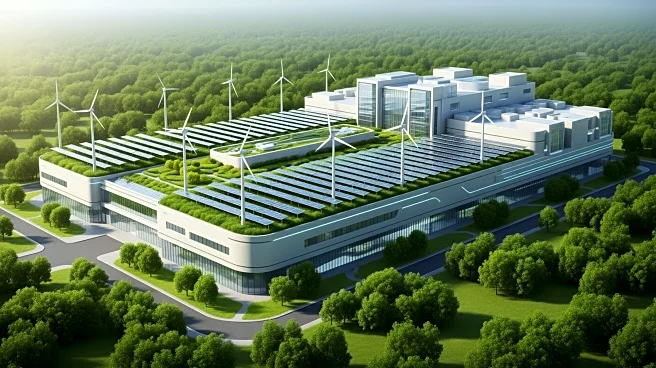What's Happening?
The semiconductor industry is experiencing significant growth due to the increasing demand for advanced electronics, including artificial intelligence infrastructure and smart devices. This growth, however,
comes with a substantial environmental impact, prompting the industry to focus on sustainability. Semiconductor fabrication plants are among the most energy-intensive facilities, and the transition to advanced technologies like 2nm nodes further increases energy consumption. To address these challenges, companies are integrating renewable energy sources, optimizing energy-intensive processes like Extreme Ultraviolet (EUV) lithography, and implementing advanced water recycling systems. Major players such as Taiwan Semiconductor Manufacturing Company (TSMC) and Intel are leading efforts in renewable energy usage and sustainable manufacturing practices.
Why It's Important?
The push for sustainability in semiconductor manufacturing has far-reaching implications beyond environmental concerns. It is crucial for the responsible growth of AI and other technologies, as data centers and AI applications demand significant energy resources. Sustainable practices in chip manufacturing can enhance global supply chain resilience, national security, and economic stability. By reducing energy consumption and waste, companies can achieve cost savings and regulatory compliance, boosting their competitive edge. The industry's shift towards sustainability is also essential for maintaining brand value and meeting the expectations of environmentally conscious consumers and investors.
What's Next?
In the coming years, the semiconductor industry is expected to accelerate the adoption of renewable energy and energy-efficient technologies. Companies like Intel aim to achieve 100% renewable energy usage by 2030. Innovations in green chemistry and water recycling will become standard practices, and AI will play a significant role in optimizing manufacturing processes. The industry will also focus on circular economy principles, emphasizing resource efficiency and waste reduction. As the demand for advanced chips continues to grow, the industry faces the challenge of balancing sustainability with performance and cost considerations.
Beyond the Headlines
The move towards sustainable semiconductor manufacturing represents a foundational shift in the tech landscape, akin to past industrial revolutions. It integrates environmental responsibility into the core of manufacturing, expanding the definition of efficiency and quality. This shift is essential for the long-term viability of AI and other technologies, as it addresses the paradox of sustainability where efficiency gains are often outpaced by demand growth. The industry's commitment to sustainability is not just an environmental initiative but a strategic imperative that will shape the future of technology and global supply chains.









